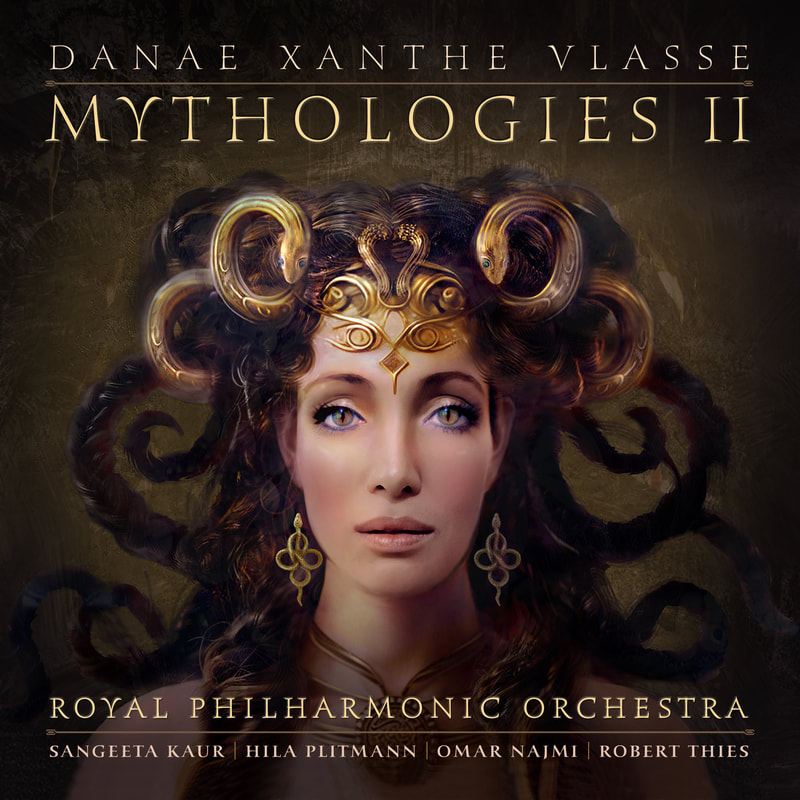Danaë Xanthe – Mythologies II (Studio Hall Records, 2024)
Few composers working today summon the majesty of myth quite like Danaë Xanthe Vlasse. With Mythologies II, a sweeping sequel to her GRAMMY-winning Mythologies, she conjures a musical pantheon where ancient figures breathe, bleed, and break into song. Anchored by the Royal Philharmonic Orchestra and elevated by stellar performances from sopranos Sangeeta Kaur and Hila Plitmann, tenor Omar Najmi, and pianist Robert Thies, this album gives it a soul-stirring second life to Greek mythology.
From the opening notes, the listener is ushered into a soundworld that is symphonic and cinematic, yes, but also deeply dramatic in the best sense: emotionally alive, morally complex, and spiritually relevant. Vlasse’s tone poems reveal each character’s inner contradictions, inviting us to ask: what do these gods and monsters reveal about ourselves?
In Vlasse’s reimagining of Medusa’s tale, she is a wronged woman whose transformation is both punishment and protection. The music mirrors this duality. Hila Plitmann and Sangeeta Kaur lend a spectral grace to Medusa’s lament, while Omar Najmi’s Perseus tempers heroism with heartbreak. The orchestration, lush, almost operatic, builds toward a transcendent moment: Pegasus rising from Medusa’s severed form. It’s myth turned metaphor, a reflection on violence, redemption, and rebirth.
The Andromeda suite, spanning six tracks, unfolds like a mini-opera. Beginning with the ominous “Ocean Overture,” the cycle channels the fury of Poseidon and the anguish of Cassiopeia, gorgeously rendered in Kaur’s and Plitmann’s duets. As the suite progresses, we witness Andromeda’s resignation, Perseus’ valiant arrival, and finally their union, musically portrayed with a reverence that never lapses into sentimentality. The dramatic arc soars, especially in “Perseus’ Proposal” and “Andromeda’s Vow & Lover’s Duet,” where love becomes both resistance and renewal.
The final track, “Dreams of Ithaca,” trades Olympus for odyssey. Here, Vlasse collaborates with lyricist David R. Brunt in a tribute to her father, weaving Odysseus’s long journey with her family’s own immigrant story. It’s a master stroke of personal and mythic fusion. Thies’s piano evokes the ache of exile; Kaur, Plitmann, and Najmi’s voices shimmer like constellations over dark water. By the time Odysseus reaches Ithaca, the emotional arrival feels collective.
While the compositions are timeless, the production is thoroughly modern. Recorded across global studios, from Abbey Road to Buenos Aires, the album’s engineering is meticulous, and its orchestrations (from Jeff Atmajian, Jon Kull, and others) are rich without overwhelming the vocal clarity.
Royal Philharmonic Orchestra
Sangeeta Kaur, soprano (1, 3-8)
Hilá Plitmann, soprano (1, 3, 4, 8)
Omar Najmi, tenor (1, 5-8)
Robert Thies, pianist
Danaë Xanthe Vlasse: singing bowl, rattle, thunder drum, orchestral chimes (1), ocean drum (2,5), piano string effects (2,4,5), and lyra (8)
Emilio D. Miler, concert toms
Buy Mythologies II.

